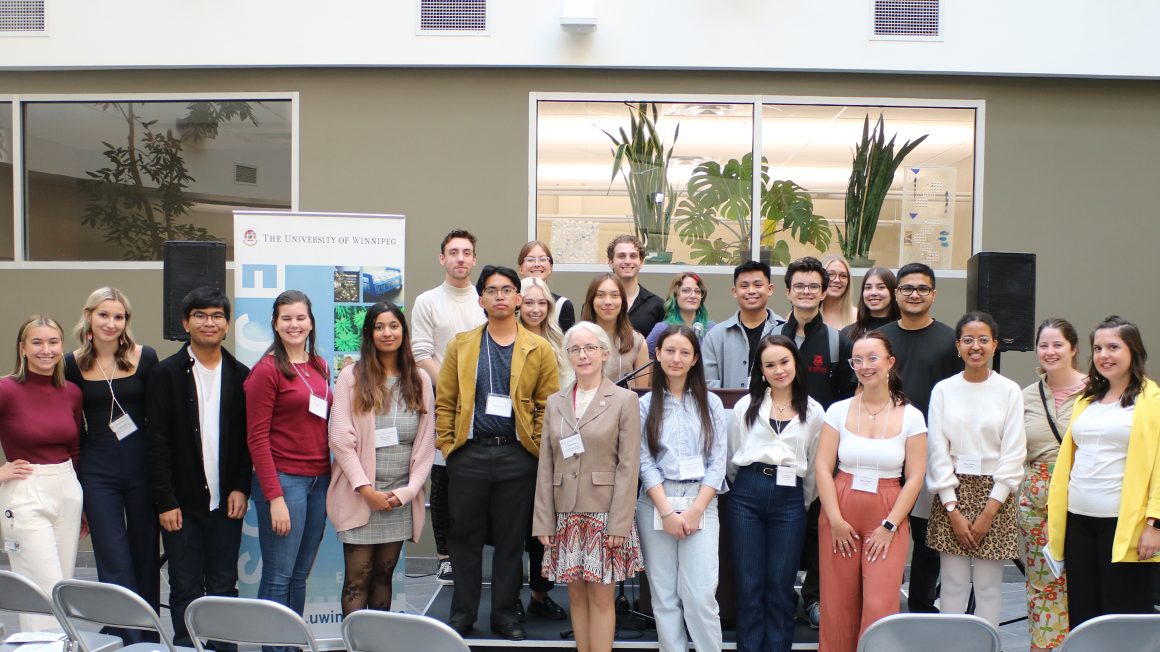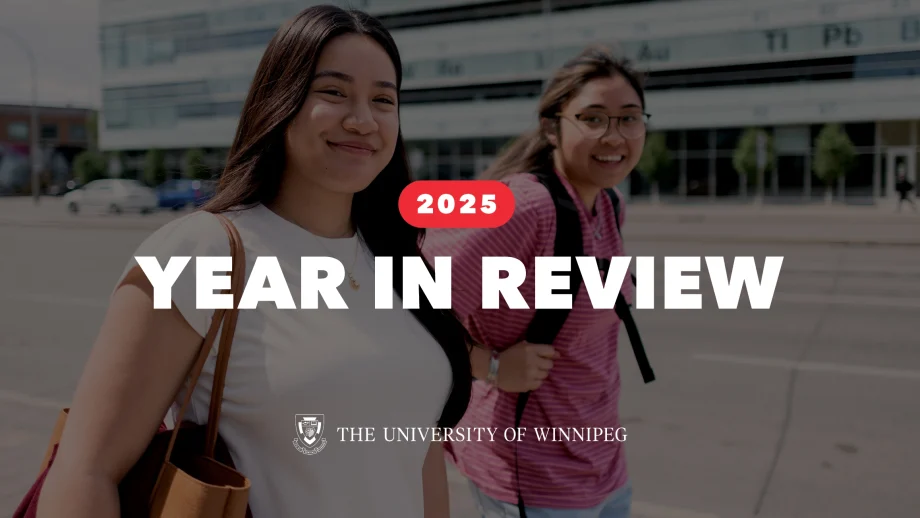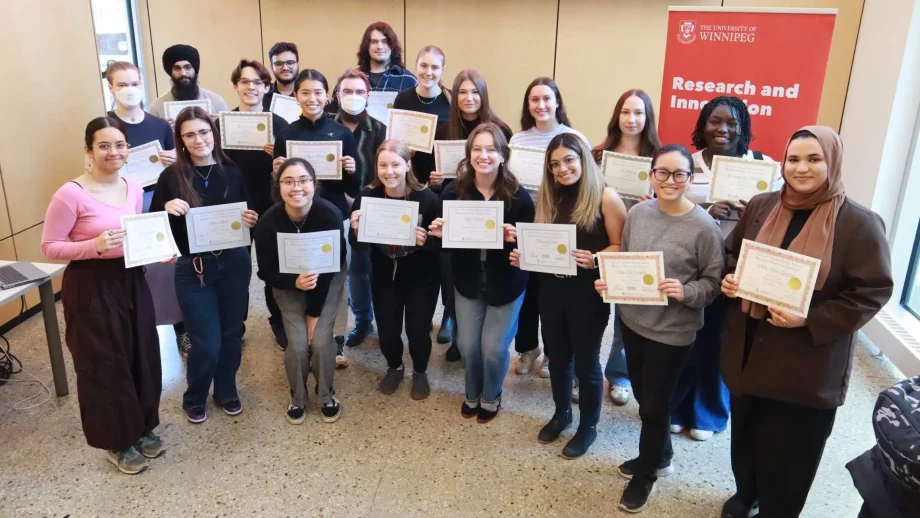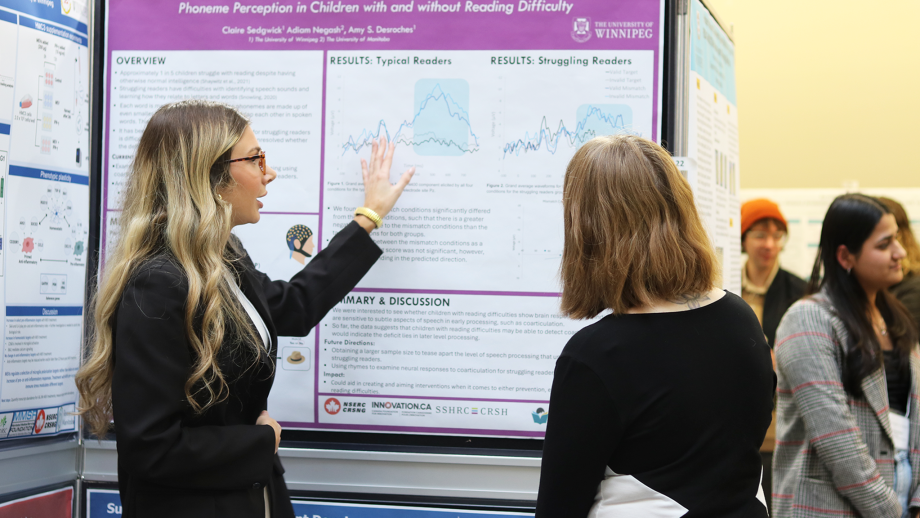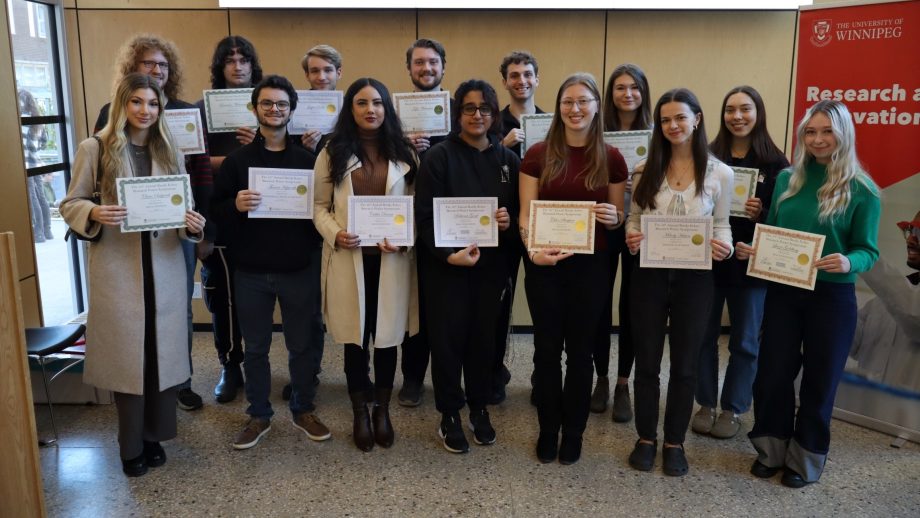The 18th annual Randy Kobes Undergraduate Poster Symposium showcased high-quality, multi-disciplinary research by undergraduate students at The University of Winnipeg.
This year, a record-setting 40 students participated and 38 posters were presented. Judges selected winners in four categories: Social Sciences, Biological and Environmental Sciences, Experimental Physical Sciences, and Mathematical and Theoretical Physical Sciences.
The symposium, held in the Richardson College for the Environment and Science Complex during Homecoming 2023, was a valuable opportunity for students to sharpen their presentation and communication skills before an audience that included alumni, faculty, and the general public. Much of the research presented will ultimately be published in leading scientific journals.
Dr. Tabitha Wood, Associate Dean of Science, Associate Professor in Chemistry, and a supervisor of three research projects included in this year’s symposium, is a big supporter.
“It is one of my favourite events of the year,” Dr. Wood said. “I enjoy walking around, getting to see the diversity and quality of the undergraduate research being conducted, speaking with the students, and hearing how they’re using the ideas they learn in lectures to solve research questions.”
The participants
Gracie Grift, a symposium participant and Pathway to Graduate Studies scholar, is active in research while pursuing her bachelor’s degree in biology. Grift thrives on finding answers and contributing to her field of study, and knows the importance of knowledge mobilization.
“It is important to practice communicating your work to a broader audience,” said Grift, whose research project on the human respiratory system won first place in the Biological and Environmental Sciences category. “Additionally, I enjoy seeing all the other interesting student’s projects at the university.”
Adiam Negash, who graduated in the spring with an honours degree in psychology, presented her research into childhood reading struggles. She won first place in the Social Sciences category and hopes her research will have an impact beyond the symposium.
“By understanding the underlying reasons for difficulty with reading, we can open the doors for changes in the education system for those who really need it,” Negash said.
She is now a graduate student at the University of Manitoba, where she will continue her research.
Ramir Joseph Tabing, whose research project won first place in the Experimental Physical Sciences category, said he appreciates his professors at UWinnipeg. He noted his advisor, Dr. Wood, has introduced him to her work as a medical chemist involving epigenetic cancer treatments through synthetic drugs.
“This connected my interests in enzymology to organic chemistry, and sparked my growing passion for research within these fields,” Tabing said. “I hope to continue researching cancer treatments in the future.”
Social Sciences
- First Place: Adiam Negash, Phonological Processing During Reading Development, supervisor Dr. Amy Desroches
- Second Place: Alina Sanina, Space in the Brain: Does Mental Arithmetic Require Mental Mapping?, supervisors Dr. Bruce Bolster and Dr. Stephanie Bugden
- Third Place: Alyssa Wright, Jumping into Order: Can a Number Line Game Improve Children’s Math Knowledge?, supervisor Dr. Stephanie Bugden
Biological and Environmental Sciences
- First Place: Gracie Grift, Elucidating the Impact of Sex-differences in the Work of Breathing on Respiratory Muscle Activation Patterns in Healthy Adults, supervisor Dr. Yannick Molgat-Seon.
- Second Place: Deidre Rooney, In Vitro Toxicology: Understanding Chemical Exposure, supervisor Dr. Jean-Pierre Desforges
- Third Place: Madison Chisholm, Inferring Cell Diameters in the Mouse Brain using Magnetic Resonance Imaging, supervisor Dr. Melanie Martin
Experimental Physical Sciences
- First Place: Ramir Joseph Tabing, Chemical Jiu-Jitsu: Optimizing Reaction Rates by Substituent Positioning, supervisor Dr. Tabitha Wood
- Second Place: Lance Lecocq-Gareau, How Sure Can You Be? Counterintuitive Crowding to Promote Chemical Reactions, supervisor Dr. Tabitha Wood
- Third Place: Jessica de Kort, Localizing Catheter Tips in Prostate Brachytherapy Ultrasound Images through a Deep Learning and Feature Extraction Pipeline, supervisor Dr. Jessica Rodgers, UManitoba
Mathematical and Theoretical Physical Sciences
- First Place: Sophia Perron, Modeling Under-Reporting of the COVID-19 Pandemic in the Interlake Regional Health Authority, supervisors Dr. Zeinab Mashreghi and Dr. Melody Ghahramani
- Second Place: Tapendra BC, The Metric Dimension of Circulant Graphs, supervisor Dr. Shonda Dueck
- Third Place: Kyle Wittmeier, Early Universe Models for Primordial Black Holes as Dark Matter Candidates, supervisor Dr. Evan McDonough

